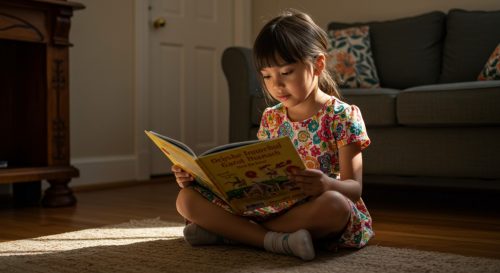How Is a Child’s Cultural Heritage Considered in Child Arrangement Orders?

How Is a Child’s Cultural Heritage Considered in Child Arrangement Orders?
Child arrangement orders are legal orders that determine where a child will live, who they will have contact with, and how decisions about their upbringing will be made. Increasingly, courts emphasise the importance of having a child’s cultural heritage considered in Child Arrangement Orders, and a childcare solicitor can help ensure these factors are properly addressed within legal proceedings.
Preserving a child’s identity and cultural connection is of utmost importance. It provides them with a sense of belonging and self-esteem, allowing them to develop a strong and positive self-identity. Promoting emotional well-being is another crucial aspect, as cultural heritage provides children with a sense of familiarity, security, and pride.
Several factors are taken into account when considering a child’s cultural heritage in arrangement orders. This includes maintaining cultural and religious practices, ensuring language and communication needs are met, involving the community and extended family, and providing opportunities for education and cultural enrichment.
However, implementing cultural considerations in child arrangement orders can present challenges. Balancing cultural needs with the child’s best interests requires careful examination and decision-making. Addressing potential conflicts and differences between the parties involved is essential for successful arrangements. Collaborative decision-making and mediation can help navigate these challenges.
There is a legal framework and guidance in place to support the consideration of a child’s cultural heritage. International conventions and human rights instruments emphasize the importance of preserving cultural identity. National laws and policies also provide guidance in making decisions that respect a child’s cultural heritage. Cultural experts and professionals can offer valuable insights and guidance throughout this process.
By incorporating a child’s cultural heritage into child arrangement orders, we can ensure their holistic well-being and enable them to grow with a strong sense of identity and connection to their roots.
How to Understand Child Arrangement Orders

The cultural heritage of a child holds significance when it comes to Child Arrangement Orders. In this section, we will explore the importance of considering a child’s cultural heritage in these orders.
From preserving identity and cultural connection to promoting emotional well-being and nurturing a sense of belonging and self-esteem, we will delve into the various aspects that make understanding and honouring a child’s cultural heritage paramount in their upbringing.
Here are some important factors to consider:
- Preserving Identity and Cultural Connection: Maintaining connections to their cultural background and heritage helps children develop a strong sense of self and belonging.
- Promoting Emotional Well-being: Emphasising the importance of cultural traditions and values can enhance a child’s emotional well-being and self-esteem.
- Nurturing a Sense of Belonging: Providing opportunities for children to engage in cultural activities and connect with their community fosters a sense of belonging and pride in their heritage.
Final Thoughts: How Is a Child’s Cultural Heritage Considered in Child Arrangement Orders?

Balancing Cultural Considerations with the Child’s Best Interests
When making child arrangement orders, it is crucial to strike a balance between cultural considerations and the child’s best interests. This involves skillfully taking into account various factors and challenges to ensure the preservation of the child’s cultural heritage while giving utmost importance to their overall well-being.
This includes effectively addressing potential conflicts, promoting collaborative decision-making, and considering guidance from cultural experts and professionals. It also entails successfully navigating legal frameworks, such as international conventions and national laws, that place a strong emphasis on safeguarding a child’s cultural identity.
International Conventions and Human Rights
International conventions and human rights form an essential foundation when it comes to considering a child’s cultural heritage in child arrangement orders. These conventions, exemplified by the United Nations Convention on the Rights of the Child (UNCRC), establish a legal framework that highlights the significance of safeguarding a child’s cultural identity and heritage.
They acknowledge the rights of children to uphold their cultural practices, languages, and traditions. National laws and policies are guided by these international conventions to ensure that the best interests of the child are prioritised while taking their cultural background into account.
To navigate these complexities and promote the well-being and growth of the child, cultural experts and professionals offer valuable guidance and expertise.
National Laws and Policies
These laws establish a legal framework for evaluating the significance of preserving a child’s cultural identity and connection. They guide decisions regarding the maintenance of cultural and religious practices, language and communication, community and extended family involvement, as well as education and cultural enrichment.
National laws and policies ensure a balance between cultural considerations and the best interests of the child, addressing potential conflicts and promoting collaborative decision-making and mediation. They are shaped by international conventions, human rights, and insights from cultural experts and professionals.
Guidance from Cultural Experts and Professionals
When it comes to considering a child’s cultural heritage in child arrangement orders, guidance from cultural experts and professionals is essential. These professionals possess extensive knowledge and deep understanding of various cultures, enabling them to offer valuable insights on how to preserve and honour a child’s cultural identity.
They can provide expert advice on maintaining cultural and religious practices, promoting effective language and communication, involving the community and extended family, and providing educational and cultural enrichment opportunities.
By collaborating with cultural experts and professionals, informed decisions can be made, placing the child’s best interests at the forefront. This ensures that the child’s cultural heritage is respected, nurtured, and prioritized, leading to a strong sense of belonging and enhanced self-esteem.
Notice: Informational Content Disclaimer
The content provided on this website, including articles, blog posts, and other informational materials, is intended for general informational purposes only. It is not intended as, and should not be considered, legal advice.
Visitors to this website should be aware that the information presented here is not a substitute for seeking legal advice from a qualified solicitor or legal professional. Each individual's legal situation is unique, and the information provided may not be applicable to specific circumstances.
If you require legal advice or have specific legal questions, we encourage you to contact us directly. Our experienced team of solicitors is here to assist you with your legal needs and provide tailored advice to address your concerns.
Please be advised that any communication through this website, including the use of contact forms or email, does not create a solicitor-client relationship. Confidential or time-sensitive information should not be sent through this website. To establish a solicitor-client relationship and discuss your legal matters in detail, please contact us for a consultation.
We strive to provide accurate and up-to-date information, but we make no representations or warranties regarding the accuracy, completeness, or suitability of the information contained on this website. We shall not be liable for any reliance placed on the information provided herein.
Thank you for visiting our website. We look forward to the opportunity to assist you with your legal needs.




